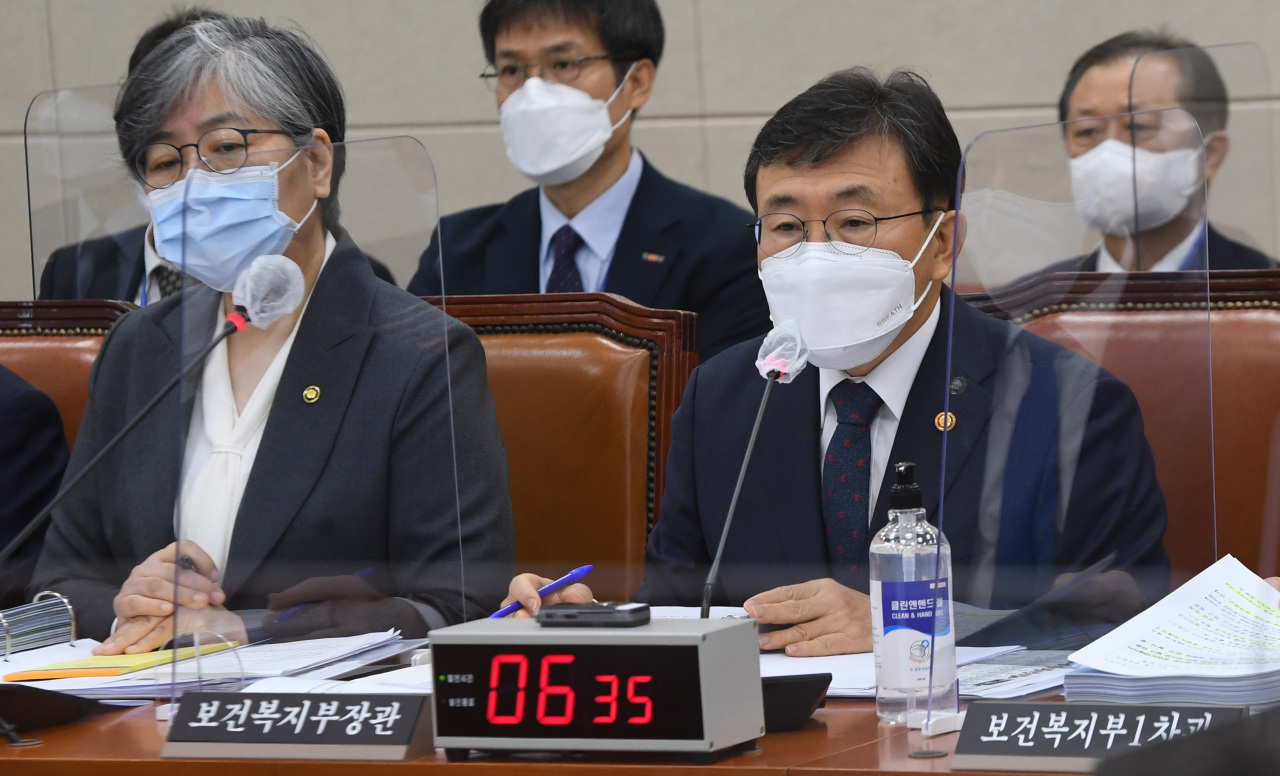South Korea could discontinue most of its COVID-19 restrictions within mere weeks, according to top health officials.
Kwon Deok-cheol, the minister of health and welfare, told lawmakers Wednesday that Nov. 1 is the likely date for the country’s “return to normal.” He said during a parliamentary audit of the ministry that the COVID-19 response team was “considering the first day of November as the date of the transition.”
Korea Disease Control and Prevention Agency Commissioner Jeong Eun-kyeong also told lawmakers on the same day that while she had previously referred to the second week of November for the possible starting point of “normalcy,” that was “not a fixed goal.”
“There’s no rule that says we must wait two weeks after 70 percent of Koreans have gotten their second dose before we can move on to the new strategy,” she said.
According to the ministry projections, Korea’s full vaccination rate is expected to top 70 percent this coming weekend. Health officials have said that after passing the vaccine target, the country would move out of remaining COVID-19 restrictions.
Seoul and its satellite cities are still under the most intensive restrictions under the four-tier social distancing scheme through the end of this month, amid the ongoing fourth wave of infections. Some of the restrictions in place include nighttime closings for food outlets and a limit on the number of people who can gather at a time.
Korea’s COVID-19 cases have come down to under 2,000 a day from a peak of over 3,200 in late September. The ministry says new cases are predicted to continue on a downward trajectory.
Even if cases do climb, Son Young-rae, spokesperson for the Health Ministry, told reporters last week that efforts for opening up “would need to push through.” In countries that ended social distancing requirements, cases have “invariably bounced back,” he said. “So it must be understood there is that risk of a case rise along the way.”
He said, however, that “in light of the inconveniences and economic harms caused by the pandemic-related curbs,” reopening “should not be halted or rolled back on account of renewed surges.”
In an Oct. 18 report submitted to the parliamentary committee on health and welfare, the ministry said it was ready to handle up to 3,000 to 4,000 cases without the health care systems collapsing, based on the rate of intensive care hospitalizations, the average length of stay in intensive care and the number of intensive care beds.
Since September, patients without serious symptoms and health conditions have been put in at-home care to ease the load on hospitals. Currently, there are 2,627 patients with active cases nationwide isolated at home. More than 13,000 patients have undergone home care so far.
While infections have fallen, deaths, on the other hand, are ticking upward. The case-fatality rate has risen to 0.62 this month after remaining at around 0.35 for the past few months. Korea has been seeing an average of 11 deaths per day so far in October, with the one-day toll recording 21 on Tuesday -- the highest since mid-January.
Kwon Jun-wook, the Korea National Institute of Health’s director, said in Thursday’s press briefing that with “booster” vaccinations that have become available for vulnerable groups, together with COVID-19 oral antivirals, the fatality rate “was forecast to go down.”
But Jeong, the national protection health agency’s chief, said earlier this week oral drugs won’t become available in the country until January or February next year.
The extent of the freedoms Koreans can expect from the shift in the government’s pandemic response has not yet been finalized, with Rep. Kim Mi-ae of the main opposition People Power Party criticizing the government was too slow in communicating with the public the changes that are due in just a few weeks.
The newly launched committee dedicated to designing the post-vaccine order, led by the prime minister’s office, is slated to make its first announcement next week, on Monday at the earliest.
Although Kwon of the NIH stated in an Oct. 14 briefing that a full vaccination rate of 85 percent was “sufficient to beat the delta variant without masks or social distancing,” the committee has said that removing the mask mandate was not a part of the plan.
Meanwhile, Korea extended its vaccine campaign to pregnant women and minors under 18 on Monday.
By Wednesday’s end, 79 percent of the 51 million population had received at least their first dose, while 67 percent had been fully vaccinated, either with a one-dose Johnson & Johnson vaccine or two dose vaccines from AstraZeneca, Pfizer or Moderna.
By Kim Arin (
arin@heraldcorp.com)








![[Today’s K-pop] Blackpink’s Jennie, Lisa invited to Coachella as solo acts](http://res.heraldm.com/phpwas/restmb_idxmake.php?idx=644&simg=/content/image/2024/11/21/20241121050099_0.jpg)